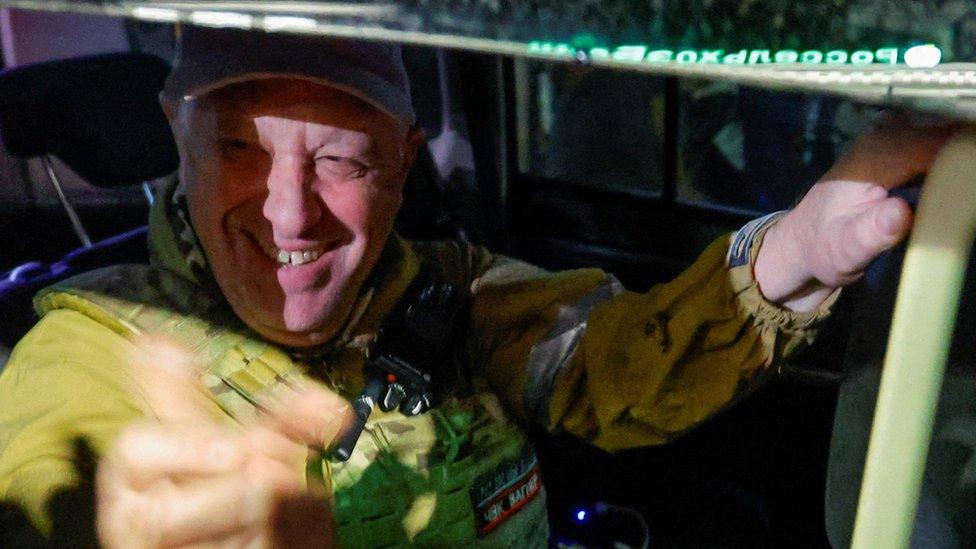Russian convicts released to fight with Wagner accused of new crimes
- Published
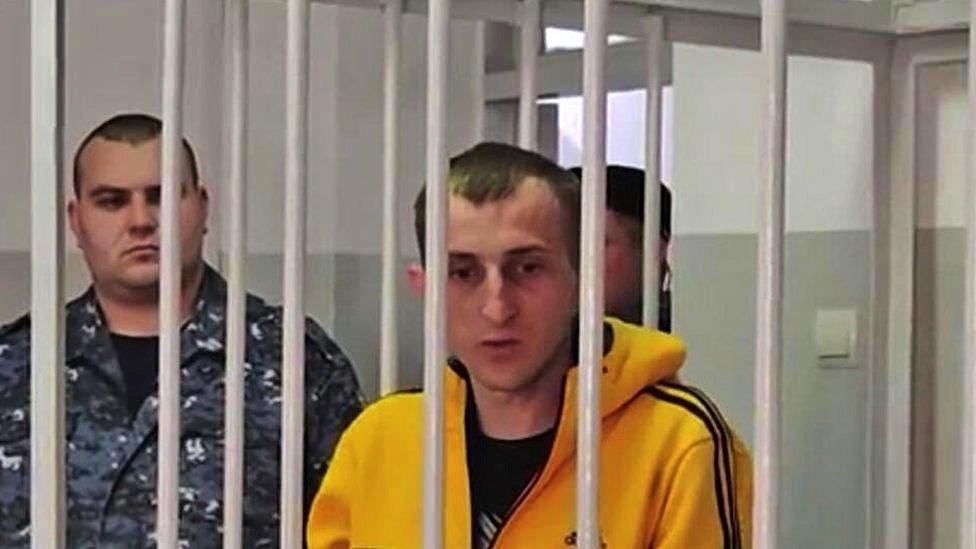
A prisoner believed to have been released early to fight with Wagner mercenaries in Ukraine has been accused of committing a double murder in Russia after returning home from the war.
Demyan Kevorkyan, who was given an 18-year prison sentence in 2016, has been arrested for killing a young man and woman on their way home from work.
He denies the accusation.
The BBC has learned he is not the only convict freed early to fight, pardoned and then accused of reoffending.
We have confirmed that suspects in about 20 serious offences, including rape and murder, are fighters recruited by the Wagner mercenary group in prison and released early to serve in Ukraine.
Kevorkyan was one of 150 prisoners recruited on 31 August 2022 when the head of Wagner, Yevgeny Prigozhin, visited his prison, according to a former inmate quoted on a social media channel.
The BBC has been told that Kevorkyan was later spotted back in his home village of Pridorozhnaya in Krasnodar, south-west Russia telling people he had just returned from the battlefields of Ukraine.
One of the people he is accused of killing is 19-year-old Tatyana Mostyko, a children's entertainer. Her mother Nadezhda shows us a video of Tatyana in a pink and blue jumpsuit, dancing and organising games at a party.
"She loved that work," says Nadezhda. "When she came back from a job, she'd laugh about what they'd been doing, how she amused them."
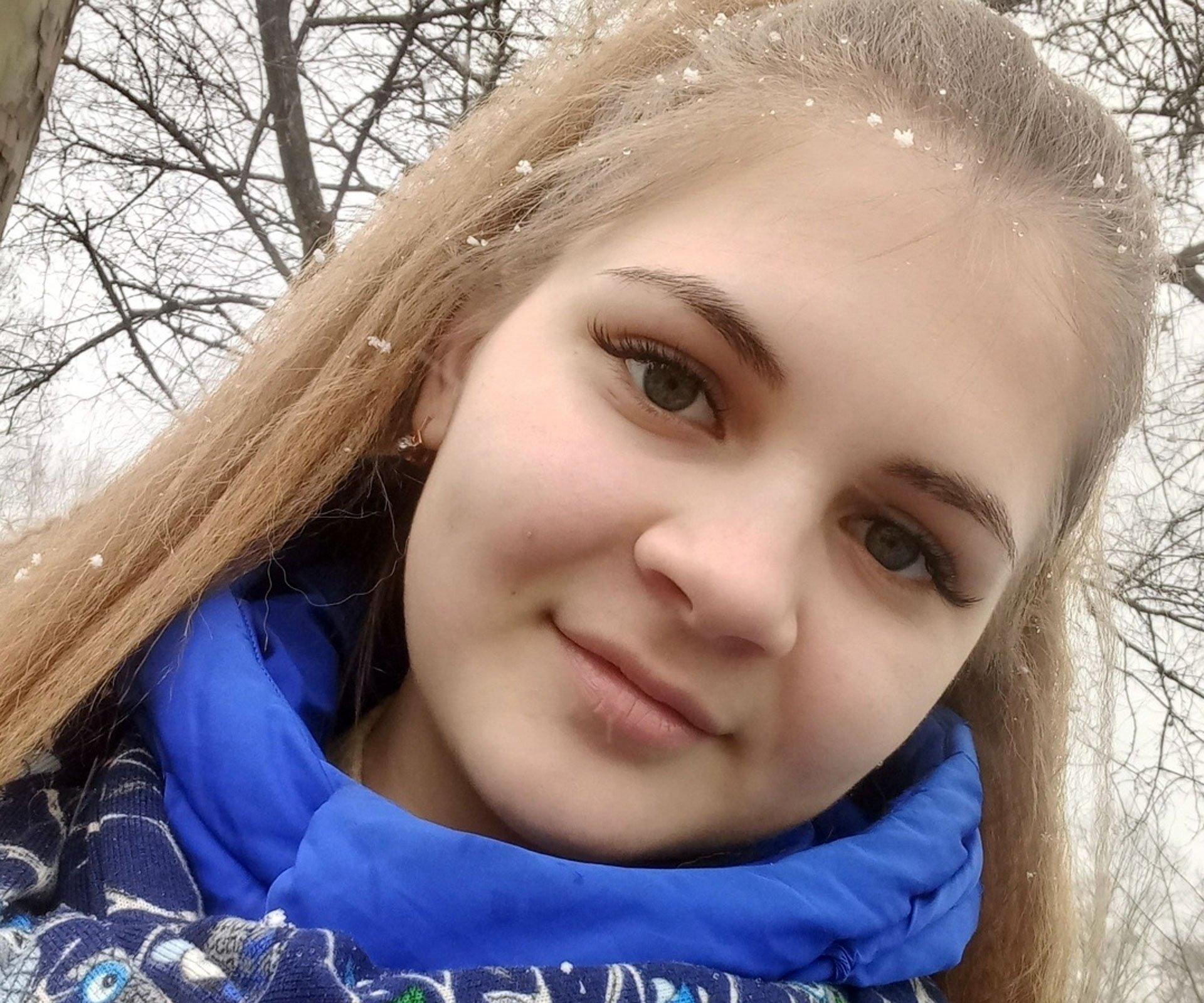
Tatyana Mostyko was murdered at the age of 19
But the last job Tatyana did was on 28 April. Her boss Kirill Chubko was driving her home when they got a puncture and pulled over on to the side of a road near the town of Berezanskaya, in south-west Russia. Kirill's wife Darya told local media he called her to say he'd be late, but not to worry as a group of young people had stopped to help them. That was the last time she heard his voice.
By morning, the pair were still not home. Sensing something was wrong, a worried Darya called the police.
Hundreds of people helped search remote countryside and Tatyana's mother began a six-hour journey to the area, catching a plane and train from her small village in Siberia, in eastern Russia.
"The worst thing was when we landed and I switched my phone back on. There were endless messages," says Nadezhda. "You can't imagine how I panicked. I hurled the phone away, because they could only mean one thing - that it was all over. It was animal fear. I can't describe it."

Find out more
Tatyana's mother, Nadezhda, tells her story on Assignment on the BBC World Service. The programme also looks at other cases of former convicts accused of fresh crimes after being freed to fight in Ukraine. Listen on BBC Sounds.
Read about the changing face of Russia's armed forces

Three suspects were arrested, including 31-year-old Kevorkyan. The other two, Anatoly Dvoynikov and Aram Tatosyan, led detectives to makeshift graves in woodland not far from Kirill's burned-out car. Kirill and Tatyana had been stabbed and police said that the young woman showed "signs of a violent death".
Dvoynikov and Tatosyan confessed to robbery and murder and said Kevorkyan was in charge, although Kevorkyan denies any involvement.
Nadezhda could not believe Kevorkyan was a free man, having been sentenced to 18 years in prison for an eerily similar crime before. "He shouldn't have got out before 2028," she says.
Kevorkyan was convicted of running a gang that had hijacked a car not far from where Tatyana and Kirill were murdered. They robbed the people inside and shot one of them dead.
"On what legitimate basis was he released?" asks Nadezhda. Under Russian law, inmates should serve at least two-thirds of their sentence. "He should have served at least 12 years. He served only six," she says, as she struggles to come to terms with the thought that Tatyana's brutal murder could have been avoided.
Who has been released?
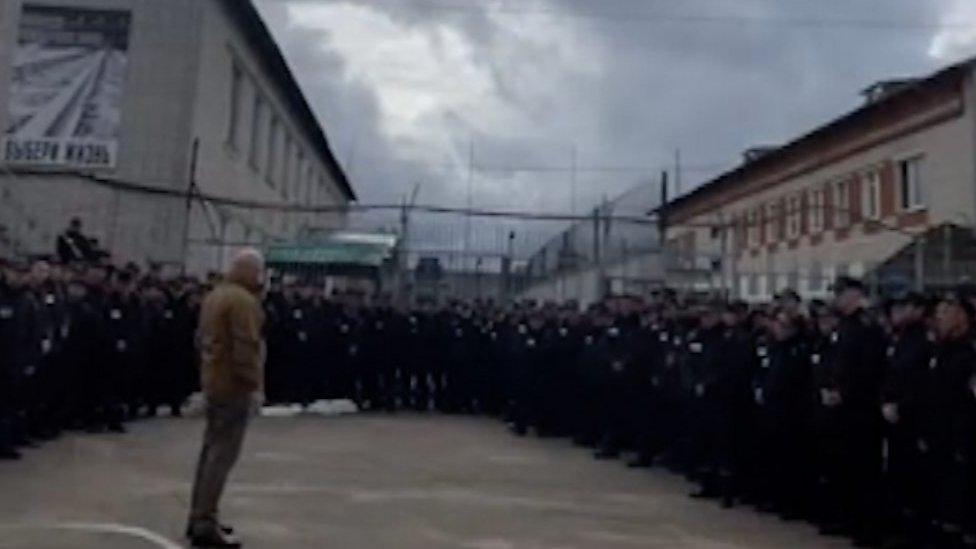
A leaked video shows Wagner's Yevgeny Prigozhin visiting a Russian prison
A video of Prigozhin at a Russian jail shows him telling rows of prisoners lined up in identical black fur hats that he prefers convicts who have murdered more than once and offenders who have beaten up a state official or policeman.
"We need your criminal talents," he says, warning them that 10% to 15% would return from Ukraine "in zinc coffins".
But he promised the ones who survived six months on the front line could go home with a bonus of 100,000 roubles ($1,000; £800) and, crucially, a pardon.
In June 2023, President Putin confirmed publicly for the first time he had been signing presidential pardons for prisoners who had returned from the Ukraine war.
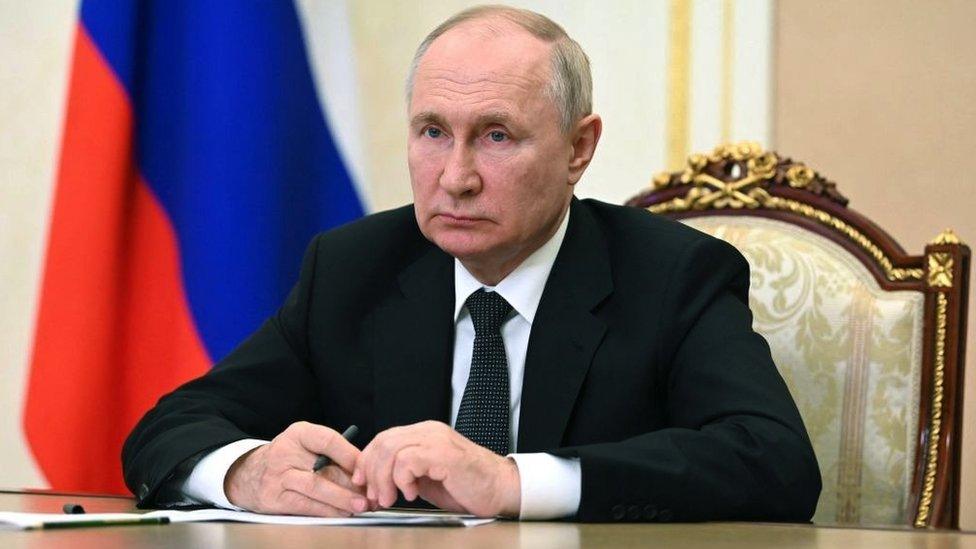
Putin has signed presidential pardons for prisoners who returned from the front line
How many have reoffended?
Prigozhin says that over the course of a year, Wagner recruited 49,000 prisoners to fight and only 32,000 returned. That's a much lower proportion than he originally promised. But independent researchers believe the real number of survivors is even lower, about 20,000.
In a video in January welcoming ex-convicts home, Prigozhin tells them: "You were an offender, as they say - now you're a war hero!"
But more of these "heroes" have been accused of crimes - the BBC has identified about 20 cases involving serious offences.
Prigozhin has claimed that the reoffending rate among ex-Wagner recruits is 10% to 20% lower than the average for released criminals.
But the director of the prisoners' rights organisation Russia Behind Bars, Olga Romanova, says the real number may be much greater because many crimes are not recorded.
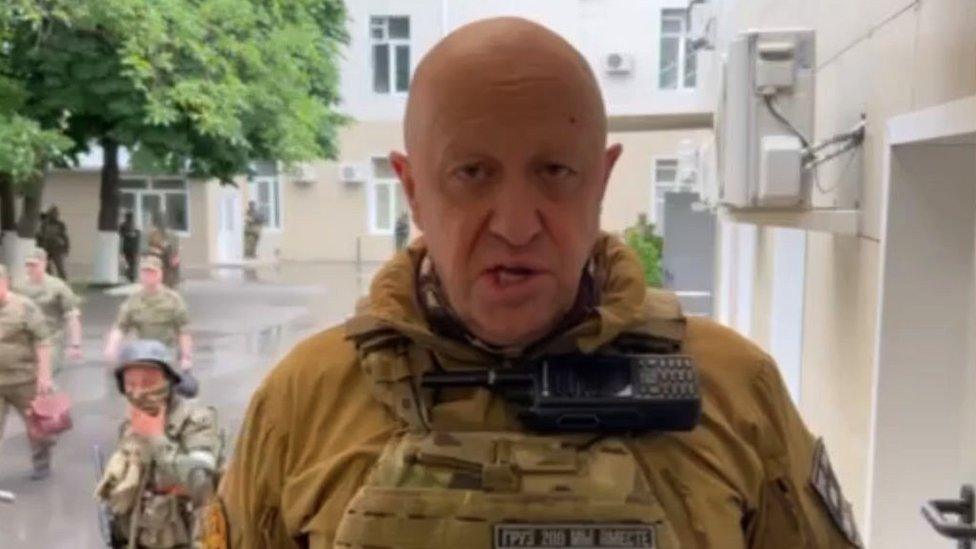
Yevgeny Prigozhin, recruited Russian convicts to fight with Wagner in Ukraine
She thinks this might be because a new law criminalises anyone who discredits people who have fought in the so-called "special military operation".
The families of other victims are also worried about ex-convicts coming home, not only unpunished but further brutalised by their experiences on the front line.
Oksana Pekhteleva's 23-year-old daughter Vera was stabbed more than 100 times, then strangled with an electric cable in an attack so violent it made headlines across Russia.
In July 2022 Vera's former boyfriend, Vladislav Kanius, was sentenced to 17 years in a penal colony for her murder. Less than a year later, it didn't occur to Oksana that he could be anywhere else. But she was wrong.
Photos of him started to appear on social media in May. He was holding a gun and wearing military uniform. To start with Oksana presumed they were fake.
But a month later she received official confirmation that Kanius had been transferred to a prison in Rostov in southern Russia, a place widely believed to be a staging point for Russian prisoners who volunteered to fight in Ukraine.
When Oksana asked the court to tell her where Kanius was they told her they were unable to find him and his location was a state secret. Given his last known location and the photos in military uniform, she thinks it is likely that he is fighting in Ukraine and if he survives will be given an official pardon and be able to return to civilian life a free man.
For a mother who spent months battling for justice for her daughter, it's a bitter blow. "This is blasphemy," she says. "It's like all of us have been assaulted. This is a signal to all scum out there: 'Do whatever you want, you won't be punished.'"
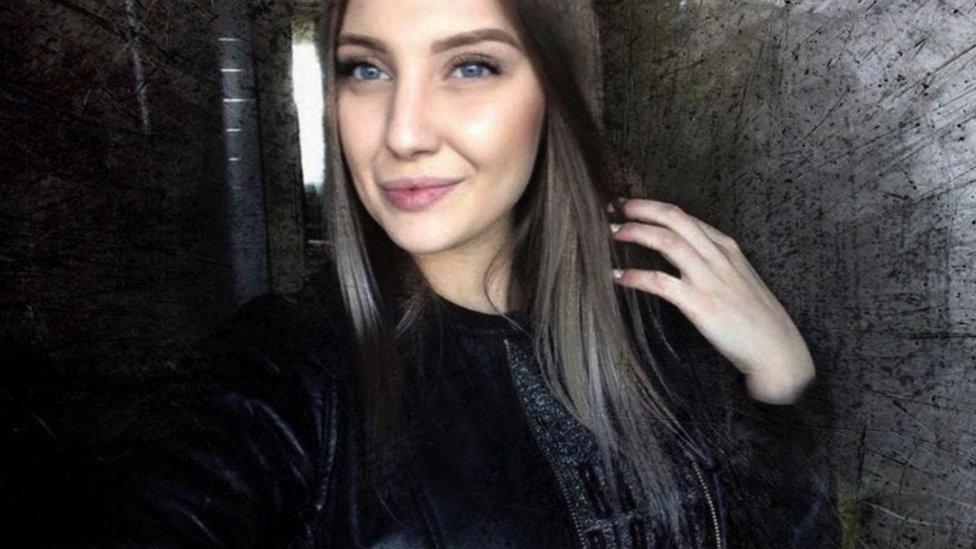
Vera Pekhteleva was stabbed 100 times and strangled to death - her murderer was released after 10 months
Many lawyers told us they are powerless to intervene - a person can't be tried twice for the same offence and the only way they can be sent back to prison is if they offend again.
This is leaving relatives of murder victims, such as Tatyana's mother, Nadezhda, terrified. The most she feels she can do is support a petition that's already gained tens of thousands of signatures to demand Kevorkyan - the chief suspect of her daughter's murder - gets a life sentence, if convicted.
"I never talk about this at home... Tatyana was taken away from me and the ground has gone from under my feet," she says, fighting back the tears.
"Of course, I understand who was responsible for my daughter's death and I know it wasn't his first offence... It's hard for me... But I'm not stupid. I understand they won't put him away for life."
Additional reporting Lorna Hankin

Sign up for our morning newsletter and get BBC News in your inbox.

Related topics
- Published15 September 2022
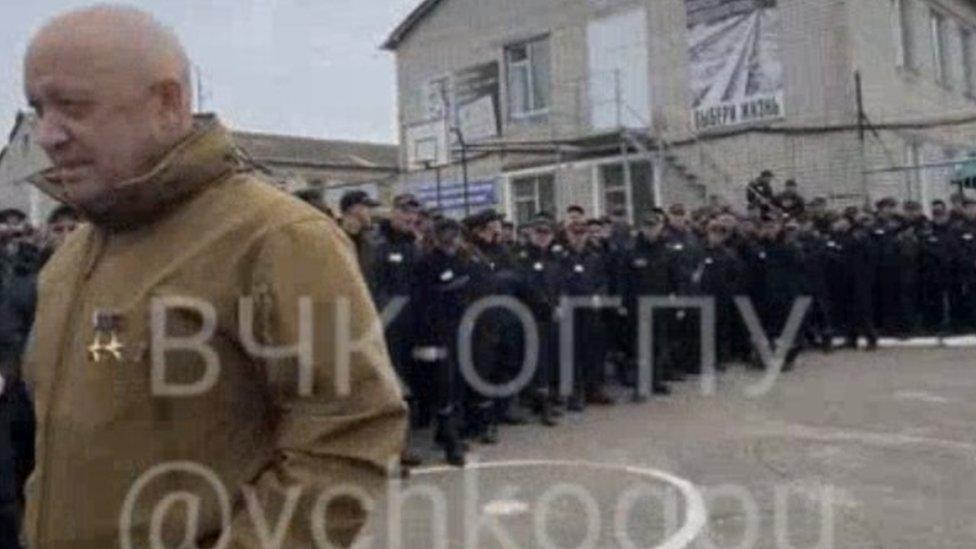
- Published4 November 2022
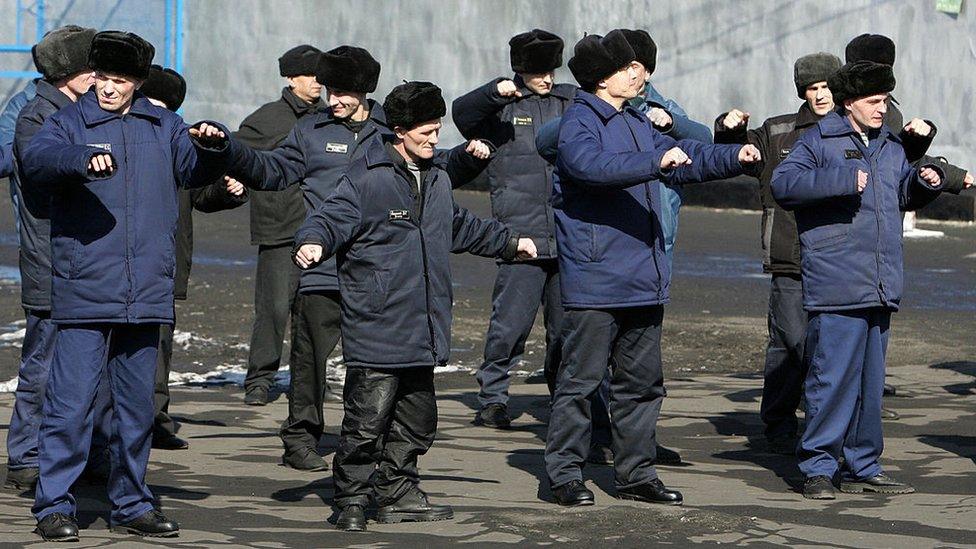
- Published14 July 2023
